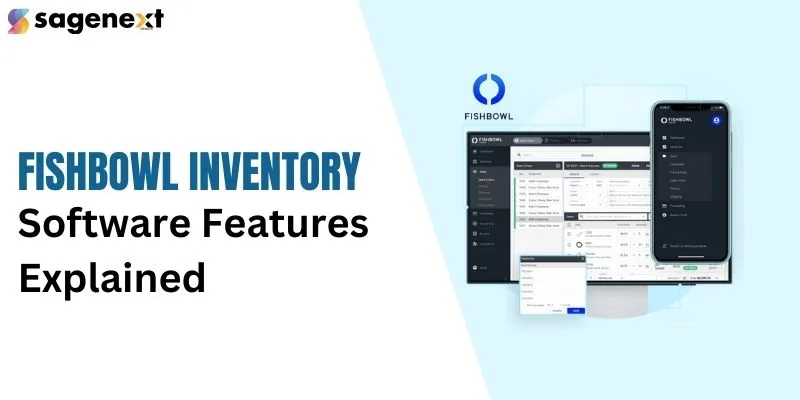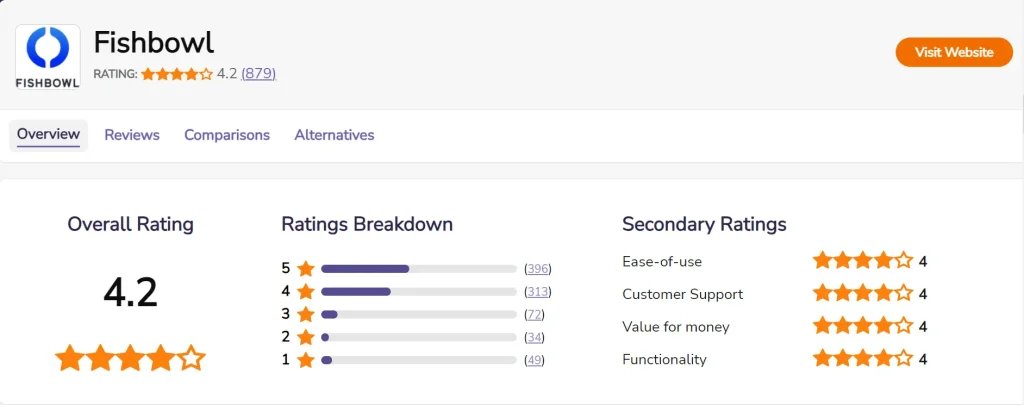
Fishbowl Inventory Management Software: Types, Features, Pricing and More
Inventory management is a critical challenge for many businesses, involving complex tasks such as keeping track of stock levels, managing costs, and meeting customer demand. Inefficient inventory management can lead to overstocking or stockouts, increased operational costs, and ultimately, unsatisfied customers. To address these challenges, businesses need a robust and reliable inventory management system.
What is Fishbowl Inventory
Fishbowl Inventory is a software solution designed to help small and medium-sized businesses manage their inventory, warehousing, and manufacturing operations. From tracking stock levels and automating reorders to optimizing production with material requirements planning, Fishbowl offers a comprehensive suite of features. It provides visibility and control on the shop floor with job control and work order management, facilitates manufacturing through management of bills of materials and production orders, and ensures accuracy and efficiency with barcode scanning capabilities.
What does Fishbowl Inventory do?
Fishbowl is designed to control complicated business processes such as production and inventory management at a price that is more accessible for businesses. It also helps businesses of any size to improve efficiency, so companies can use it to improve warehouse operations.
The Fishbowl is one of the most popular manufacturing and warehouse management add-ons for QuickBooks. By integrating Fishbowl with Quickbooks it simplifies various inventory management chores and assists businesses in achieving financial savings. Moreover, users won’t have to learn a new system framework when they start using Fishbowl.
Fishbowl also feeds the information into QuickBooks to create invoices and does other essential accounting tasks. It makes it easier to keep track of everything.
Benefits and Features of Fishbowl Inventory
1. Comprehensive Inventory Tracking
Fishbowl Inventory provides detailed tracking of inventory levels, locations, and movements. This helps businesses maintain accurate records and avoid issues related to overstocking or stockouts.
2. Integration with Accounting Software
Fishbowl seamlessly integrates with popular accounting software like Quickbooks, Xero, Shopify, Shipstation, and more. This integration ensures that inventory data is automatically updated in the accounting system, reducing manual entry errors and improving financial accuracy.
3. Cost Management
By providing real-time insights into inventory costs, Fishbowl helps businesses manage expenses more effectively. It allows for better budgeting and cost control, leading to increased profitability.
4. Enhanced Order Management
Fishbowl streamlines the order management process by automating tasks such as order creation, tracking, and fulfillment. This ensures timely and accurate processing of orders, improving customer satisfaction.
5. Scalability
Fishbowl is designed to grow with your business. It can handle the inventory management needs of small businesses as well as large enterprises, making it a versatile solution for businesses of all sizes.
6. Manufacturing and Assembly Support
Fishbowl includes features for manufacturing and assembly processes. It allows businesses to manage production schedules, track work orders, and monitor the usage of raw materials, enhancing overall production efficiency.
7. Improved Customer Satisfaction
With better inventory management, businesses can meet customer demand more reliably. Fishbowl helps ensure that the right products are available at the right time, leading to improved customer satisfaction and loyalty.
8. Real-Time Reporting and Analytics
Fishbowl provides real-time reporting and analytics, giving businesses valuable insights into their inventory performance. This data-driven approach helps in making informed decisions and identifying areas for improvement.
9. Multi-Location Management
For businesses with multiple locations, Fishbowl offers robust multi-location management capabilities. It allows for centralized control and visibility over inventory across different warehouses or stores.
10. Ease of Use
Despite its comprehensive features, Fishbowl is user-friendly and easy to implement. The intuitive interface ensures that staff can quickly learn and use the system, reducing the time required for training.
By leveraging these benefits, US businesses can streamline their inventory management processes, reduce operational costs, and enhance overall efficiency and customer satisfaction. Fishbowl Inventory is a powerful tool that addresses the unique challenges of inventory management, making it an invaluable asset for any business.
Pros and Cons of Fishbowl
Pros of Fishbowl |
Cons of Fishbowl |
| Comprehensive Inventory Tracking: Fishbowl allows for detailed tracking of inventory across multiple locations and provides real-time updates. | Learning Curve: The software can have a steep learning curve for new users, requiring time and training to fully utilize its features. |
| Seamless QuickBooks Integration: Fishbowl integrates seamlessly with QuickBooks, ensuring synchronized inventory and financial data. | Initial Setup Complexity: Setting up Fishbowl can be complex and time-consuming, particularly for businesses with large or intricate inventories. |
| Automated Order Management: Automates sales orders, purchase orders, and work orders, streamlining order processes. | Cost: The software can be expensive, especially for small businesses, due to licensing fees and potential additional costs for training and support. |
| Supports Manufacturing and Assembly: Features like BOM, work orders, and production scheduling support manufacturing and assembly processes. | Limited Customer Support: Some users have reported that customer support can be slow to respond and not always helpful in resolving issues. |
| Barcode Scanning Capabilities: Improves efficiency and accuracy in inventory counting, receiving, and shipping. | System Performance: Some users have experienced performance issues, such as slow system response times, particularly with large datasets. |
| Real-Time Reporting and Analytics: Offers powerful reporting tools for insights into inventory performance and sales trends. | User Interface: While functional, some users find the interface to be outdated and not as intuitive as other modern software solutions. |
| Multi-Location Management: Allows for centralized control of inventory across multiple warehouses or locations. | Customization Limitations: While Fishbowl offers many features, some users may find limitations in customizing the software to fit their specific needs. |
| Customizable Alerts: Users can set alerts for critical inventory events, helping to prevent stockouts and overstocking. | Integration Limitations: While it integrates well with QuickBooks, integration with other software systems may be limited or require additional customization. |
| Advanced Inventory Forecasting: Helps predict future inventory needs based on historical data and trends. | Upgrade Costs: Regular software updates and upgrades may come with additional costs, which can add up over time. |
| User-Friendly Interface: Despite its comprehensive features, the interface is designed to be easy to navigate for users. | Mobile Access: Limited functionality in mobile applications compared to the desktop version, which can hinder remote management. |
Types of Fishbowl Software
1. Fishbowl Manufacturing
This version of comprehensive manufacturing inventory management software includes advanced work orders, bills of materials, barcode scanning, production stages, multi-location, and labor & job tracking. It has MRP, eCommerce integration, shipping, EDI integration, landed costs, CRM integrations, business intelligence, and hassle-free integration with QuickBooks.
Organizations relying on manual inventory counts or accounting software like QuickBooks can benefit from Fishbowl manufacturing software. It is a program that offers automated inventory control and helps small and medium-sized businesses with inventory management and business process automation.
2. Fishbowl Warehouse
Fishbowl Warehouse is a warehouse management system (WMS) developed to make warehouse activities easier and boost overall efficiency. Mobile devices eliminate the need for paper-based documentation by allowing for the scanning of products, the creation of invoices, and the management of inventories.
Stock alerts, reordering, shipping, receiving, barcode support, multi-location support, serial/lot tracking, eCommerce, CRM, and EDI integrations, true-cost calculations, employee time tracking, business intelligence, and seamless QuickBooks integration are just some of the features offered by Fishbowl Warehouse.
3. Fishbowl Online
It is offers complete inventory management, tight QuickBooks integration, and the ability to access the program from any Internet-connected device (including your smartphone, which can be used to scan barcodes) are just a few of the features offered by its cloud-based Inventory Management for QuickBooks.
Fishbowl Inventory Pricing
| Feature | Basic Plan | Standard Plan | Advanced Plan |
| Monthly Price (estimate) | $329 | $549 | $799 |
| Number of Users | 1-2 | 3-5 | 6-10 |
| Features | Limited inventory management, basic reporting | Inventory management, basic manufacturing, some integrations | Advanced inventory management, manufacturing, CRM integration, eCommerce tools |
Top Add-ons For Fishbowl
1. Barcode
The Barcode add-on enhances inventory accuracy and efficiency by allowing seamless scanning and tracking of items.
2. POS (Point of Sale)
The POS add-on streamlines sales transactions, integrating seamlessly with Fishbowl to ensure real-time inventory updates and accurate sales data.
3. Hosted Services
Hosted Services provide cloud-based solutions for Fishbowl, offering secure, remote access to inventory management and data.
4. EDI (Electronic Data Interchange)
The EDI add-on facilitates the electronic exchange of documents between businesses, improving communication and reducing errors.
5. E-commerce
The e-commerce add-on integrates with online platforms, enabling efficient management of online orders and inventory synchronization.
6. Merchant Services
Merchant Services streamline payment processing, integrating with Fishbowl to ensure seamless financial transactions and accurate record-keeping.
Alternatives of Fishbowl
Fishbowl Inventory is a popular choice for inventory management, but it’s not the only option. Here are some strong alternatives to consider, each with its own strengths and weaknesses:
1. Zoho Inventory
Pros: Cloud-based, user-friendly, affordable, integrates with Zoho ecosystem.
Cons: Feature set might be limited for complex businesses compared to Fishbowl.
2. Odoo Inventory
Pros: Open source core version, highly customizable, extensive features.
Cons: Can be complex to set up and require technical expertise for customization.
3. TradeGecko
Pros: Strong e-commerce integration, robust reporting tools, good fit for growing businesses.
Cons: May be pricier than some options, might have a steeper learning curve.
4. Veeqo
Pros: Excellent for omnichannel retail, real-time inventory visibility, automation features.
Cons: Can be expensive for smaller businesses, focuses more on retail than manufacturing.
5. Cin7
Pros: Scalable solution for complex businesses, advanced warehouse management features.
Cons: Higher price point, significant implementation time for larger systems.
6. Sortly
Pros: Free plan for basic needs, mobile app, simple interface.
Cons: Limited features compared to paid options, scalability might be an issue for larger businesses.
Fishbowl Inventory Reviews
Fishbowl Inventory has garnered a positive reputation among users, with an impressive overall rating of 4.2 stars based on 864 reviews on Software Advice. This strong user feedback suggests Fishbowl delivers on its promises, helping businesses streamline inventory management.

Conclusion
FishBowl is a versatile tool that assists in inventory tracking and production planning, and it was designed with the industrial industry in mind. Fishbowl ranks high amongst our add-ons for inventory management software; however, companies should look at their requirements before purchasing. Plus, users can quickly track costs from the beginning of production right up until the time of your sale, thanks to the integration of Fishbowl and QuickBooks.Fishbowl Inventory is an easy-to-use inventory system that works well with almost all accounting software. It provides more accurate numbers and more information about how your business is doing.
FAQs
Is fishbowl an ERP system?
Fishbowl is not an ERP application but integrates with some ERPs like Xero, QuickBooks, eBay, and USPS.
Who owns fishbowl inventory?
Fishbowl Inventory is owned by Diversis Capital, a private equity firm that acquired the company in 2021.
Who are the typical users of fishbowl software?
Typical users of Fishbowl Software include small to mid-sized businesses in manufacturing, wholesale distribution, and retail sectors.
Is fishbowl software cloud-based?
Fishbowl offers both on-premise and cloud-based solutions, allowing businesses to choose the option that best fits their needs.
Is fishbowl owned by glassdoor?
No, Fishbowl is not owned by Glassdoor. Fishbowl Inventory is owned by Diversis Capital.
How much does fishbowl inventory cost?
Fishbowl Inventory uses a subscription model with tiered pricing based on features and user capacity. While exact costs might require contacting them directly, estimates range from $329 per month for basic plans to over $1,000 per month for advanced plans.
Why fishbowl inventory is not match with quickbook inventory?
Discrepancies between Fishbowl Inventory and QuickBooks Inventory can occur due to differences in how each system handles inventory transactions, updates, and synchronization. Ensuring regular and accurate integration and reconciliation of data can help minimize these mismatches.
What date does fifo use in fishbowl inventory?
Fishbowl Inventory uses the date when inventory items are received into stock for FIFO (First In, First Out) purposes, ensuring that the oldest stock is used or sold first.







